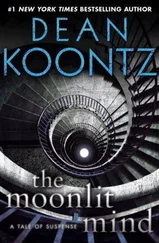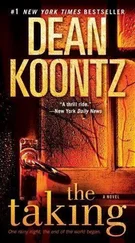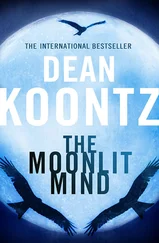Dean Koontz - The Mask
Здесь есть возможность читать онлайн «Dean Koontz - The Mask» весь текст электронной книги совершенно бесплатно (целиком полную версию без сокращений). В некоторых случаях можно слушать аудио, скачать через торрент в формате fb2 и присутствует краткое содержание. Жанр: Триллер, на английском языке. Описание произведения, (предисловие) а так же отзывы посетителей доступны на портале библиотеки ЛибКат.
- Название:The Mask
- Автор:
- Жанр:
- Год:неизвестен
- ISBN:нет данных
- Рейтинг книги:5 / 5. Голосов: 1
-
Избранное:Добавить в избранное
- Отзывы:
-
Ваша оценка:
- 100
- 1
- 2
- 3
- 4
- 5
The Mask: краткое содержание, описание и аннотация
Предлагаем к чтению аннотацию, описание, краткое содержание или предисловие (зависит от того, что написал сам автор книги «The Mask»). Если вы не нашли необходимую информацию о книге — напишите в комментариях, мы постараемся отыскать её.
The Mask — читать онлайн бесплатно полную книгу (весь текст) целиком
Ниже представлен текст книги, разбитый по страницам. Система сохранения места последней прочитанной страницы, позволяет с удобством читать онлайн бесплатно книгу «The Mask», без необходимости каждый раз заново искать на чём Вы остановились. Поставьте закладку, и сможете в любой момент перейти на страницу, на которой закончили чтение.
Интервал:
Закладка:
The driver of the Cadillac, a tall man with a goatee, stepped around the end of the VW Rabbit and looked down at the injured girl. “Is she dead?”
“No,” Carol said. She gently thumbed back one of the girl’s eyelids, then the other. “Just unconscious.
Probably a mild concussion. Is anyone calling an ambulance?”
“I don’t know,” he said.
“Then you call one. Quickly.”
He hurried away, splashing through a puddle that was deeper than the tops of his shoes.
Carol pressed down on the girl’s chin; the jaw was slack, and the mouth fell open easily. There was no visible obstruction, no blood, nothing that might choke her, and her tongue was in a safe position.
A gray-haired woman in a transparent plastic raincoat, carrying a red and orange umbrella, ‘appeared out of the rain. “It wasn’t your fault,” she told Carol.
“I saw it happen. I saw it all. The child darted out in front of you without looking. There wasn’t a thing you could have done to prevent it.”
“I saw it, too,” said a portly man who didn’t quite fit under his black umbrella. “I saw the kid walking
down the street like she was in a trance or something.
No coat, no umbrella. Eyes kind of blank. She stepped off the curb, between those two vans, and just stood there for a few seconds, like she was just waiting for someone to come along so she could step out and get herself killed. And by God, that’s what happened.”
“She’s not dead,” Carol said, unable to keep a tremor out of her voice. “There’s a first-aid kit on the back seat of my car. Will one of you get it for me?”
“Sure,” the portly man said, turning toward the vw.
The first-aid kit contained, among other things, a packet of tongue depressors, and Carol wanted to have those handy. Although the unconscious girl didn’t appear to be headed for imminent convulsions, Carol intended to be prepared for the worst.
A crowd had begun to gather.
A siren sounded a couple of blocks away, approaching fast. It was probably the police; the ambulance couldn’t have made it so fast.
“Such a pretty child,” the gray-haired woman said, staring down at the stricken girl.
Other onlookers murmured in agreement.
Carol stood up and stripped out of her raincoat.
There was no point in covering the girl, for she was already as wet as she could get. Instead, Carol folded the coat, knelt down again, and carefully slipped the makeshift pillow under the victim, elevating her head just a bit above the gushing water.
The girl didn’t open her eyes or stir in any way whatsoever. A tangled strand of golden hair had fallen across her face, and Carol carefully pushed it aside for her. The girl’s skin was hot to the touch, fevered, in spite of the cold rain that bathed it.
Suddenly, while her fingers were still touching the
girl’s cheek, Carol felt dizzy and was unable to get her breath. For a moment she thought she was going to pass out and collapse on top of the unconscious teenager. A black wave rose behind her eyes, and then in that darkness there was a brief flash of silver, a glint of light off a moving object, the mysterious thing from her nightmare.
She gritted her teeth, shook her head, and refused to be swept away in that dark wave. She pulled her hand away from the girl’s cheek, put it to her own face; the dizzy spell passed as abruptly as it had come. Until the ambulance arrived, she was responsible for the injured girl, and she was determined not to fail in that responsibility.
Huffing slightly, the portly man hurried back with the first-aid kit. Carol took one of the tongue depressors out of its crisp cellophane wrapper — just in case.
A police car rounded the corner and stopped behind the Volkswagen. Its revolving emergency beacons splashed red light across the wet pavement and appeared to transform the puddles of rainwater into pools of blood.
As the squad car’s siren died with a growl, another, more distant siren became audible. To Carol, that warbling, high-pitched wail was the sweetest sound in the world.
The horror is almost over, she thought.
But then she looked at the girl’s chalk-white face, and her relief was clouded with doubt. Perhaps the horror wasn’t over after all; perhaps it had only just begun.
Upstairs, Paul walked slowly from room to room, listening to the hammering sound.
Thunk. thunk…
The source was still overhead. In the attic. Or on the roof.
The attic stairs were behind a paneled door at the end of the second-floor hallway. They were narrow, unpainted, and they creaked as Paul climbed them.
Although the attic had full flooring, it was not otherwise a finished room. The construction of the walls was open for inspection; the pink fiber glass insulation , which somewhat resembled raw meat, and the regularly spaced supporting studs, like ribs of bone, were visible. Two naked, hundred-watt bulbs furnished light, and shadows coiled everywhere, especially toward the eaves. For all of its length and for half of its width, the attic was high enough to allow Paul to walk through it without stooping.
The patter of rain on the roof was more than just a patter up here. It was a steady hissing, a soft, all-encompassing roar.
Nevertheless, the other sound was audible above the drumming of the rain: Thunk.. thunk-thunk…
Paul moved slowly past stacks of cardboard cartons and other items that had been consigned to storage: a pair of large touring trunks; an old six-pronged coat rack; a tarnished brass floor lamp; two busted-out, cane-bottomed chairs that he intended to restore some day. A thin film of whitish dust draped shroudlike over all the contents of the room.
Thunk. thunk…
He walked the length of the attic, then slowly returned to the center of it and stopped. The source of the sound seemed to be directly in front of his face, only inches away. But there was nothing here that could possibly be the cause of the disturbance; nothing moved.
Thunk.. thunk. thunk. thunk…
Although the hammering was softer now than it had been a few minutes ago, it was still solid and forceful; it reverberated through the frame of the house. The pounding had acquired a monotonously simple rhythm, too; each blow was separated from the ones before and after it by equal measures of time, resulting in a pattern not unlike the beating of a heart.
Paul stood in the attic, in the dust, smelling the musty odor common to all unused places, trying to get a fix on the sound, trying to understand how it could be coming out of thin air, and gradually his attitude toward the disturbance changed. He had been thinking of it as nothing more than the audible evidence of storm damage to the house, as nothing more than tedious and perhaps expensive repairs that might have to be made, an interruption in his writing schedule, an inconvenience, nothing more. But as he turned his head from side to side and squinted into every shadow, as he listened to the relentless thudding, he suddenly perceived that there was something ominous about the sound.
Thunk. thunk.. thunk…
For reasons he could not define, the noise now seemed threatening, malevolent.
He felt colder in this sheltered place than he had felt outside in the wind and rain.
***
Carol wanted to ride to the hospital in the ambulance with the injured girl, but she knew she would only be in the way. Besides, the first police officer on the scene, a curly-headed young man named Tom Weatherby, needed to get a statement from her.
They sat in the front seat of the patrol car, which smelled like the peppermint lozenges on which Weatherby was sucking. The windows were made opaque by shimmering streams of rain. The police radio sputtered and crackled.
Читать дальшеИнтервал:
Закладка:
Похожие книги на «The Mask»
Представляем Вашему вниманию похожие книги на «The Mask» списком для выбора. Мы отобрали схожую по названию и смыслу литературу в надежде предоставить читателям больше вариантов отыскать новые, интересные, ещё непрочитанные произведения.
Обсуждение, отзывы о книге «The Mask» и просто собственные мнения читателей. Оставьте ваши комментарии, напишите, что Вы думаете о произведении, его смысле или главных героях. Укажите что конкретно понравилось, а что нет, и почему Вы так считаете.










